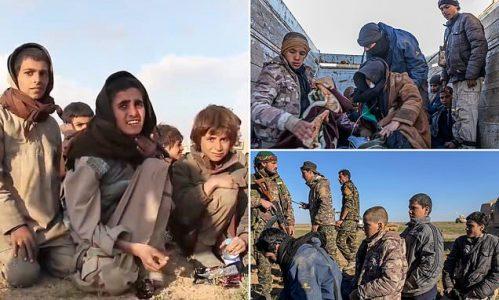
Yazidi boy’s rescue, reunion with family a bright spot amid humanitarian crisis in Mosul
Among the Iraqis freed in the U.S.-led coalition’s liberation of Mosul from the Islamic State this month was Emad Mshko Tamo, a Yazidi who was separated from his family and trained as a soldier by the terrorist army for the past three years.
Wounded from shrapnel and covered in dust, the emaciated former captive shook hands with the Iraqi soldiers who freed him. He accepted a bottle of water and held it in his lap, sitting in the front seat of a truck that was to take him to a hospital for treatment. Emad is 12 years old.
While the Iraqi government celebrates its victory over the Islamic State in Mosul, aid organizations report that hundreds of civilians remain trapped in the Old City and the humanitarian crisis in Iraq continues to mount, with 3 million refugees and almost 1 million displaced people from Mosul.
“In the last week of fighting, 12,000 civilians were evacuated, [and] their condition was the worst of the entire war,” Lise Grande, the lead coordinator of the U.N. Assistance Mission for Iraq, said Monday during a press conference.
“Many were elderly, disabled. There were separated children. They clearly did not have sufficient water, they hadn’t had sufficient food, and the overwhelming majority of the civilians who came out were unable, even on their own, to cross the front line to safety. They had to be helped,” said Ms. Grande, adding that the levels of trauma in Mosul are among the highest anywhere.
The Iraqi army next will move to liberate the cities of Tal Afar, Hawija and western Anbar province, and humanitarian organizations are preparing for an even larger crisis.
Among the concerns are those for orphaned children and those separated from their families. Ms. Grande was unable to provide estimates but said the numbers are large and will require specialized care for months and even years to come.
Emad’s story is a bright spot in an otherwise dark saga, said Dlo Yaseen, an Iraqi-Kurdish translator who helped the 12-year-old while he was being transferred between hospitals from Mosul to Irbil.
Terrorists kidnapped Emad in the summer of 2014 from his village near Sinjar. He was one of thousands of victims of the Islamic State’s campaign of genocide against the Yazidi people — a Kurdish minority whose religious tradition, which mixes aspects of Christianity, Islam and Zoroastrianism, is regarded as apostasy by the Islamic State.
The militants reportedly executed thousands of Yazidi men and boys and at least 86 women, and kidnapped and sold Yazidi women into sex slavery — among other crimes against humanity. An independent survey and analysis of survivors, family members and civilians estimates that 3,700 Yazidis were slain or died during the summer assault, and that of the 6,800 who were kidnapped, 2,500 are still missing.
In Mosul, when the Iraqi soldiers realized that Emad was Yazidi, they called the only Yazidi soldier in their unit, Mr. Yaseen said. The soldier recognized Emad’s family name and was able to locate his relatives in Dohuk, a Kurdish city in northwestern Iraq.
Shrapnel from Iraqi army mortar fire had wounded Emad. Although Islamic State captors tried to treat him, he was still suffering. Personnel at a field hospital decided that he would be transferred to a larger hospital in Irbil for surgery.
In the meantime, five of Emad’s uncles traveled the few hours’ drive from Dohuk to Irbil for the reunion. They also brought news of Emad’s mother, who had traveled to Canada a few months earlier with two of his siblings. Emad and his mother were able to talk via Facebook chat.
Yazda, an international Yazidi aid organization, corroborated Emad’s story, saying his mother was resettled in Canada with the help of the U.N. High Commissioner for Refugees after the government’s decision to take in Yazidi survivors.
Shortly after Emad’s rescue, Mr. Yaseen posted a photo of him on Facebook: “A Yazidi boy rescued under ISIS and rejoined his relative.”
The photo is striking — Emad is composed, sitting in the passenger seat of the truck, his face turned toward the camera. He is covered in grime — a large and dirty blue T-shirt is the only clothing covering his twiglike frame. His blond hair sticks up at all ends, his face is covered in white dust, but his lips are red and stained with blood. His expression is calm, a slight furrow to his brows as they arch upward.
“I asked him, ‘How do you feel now that you are rescued?’ ” Mr. Yaseen said. “He said, ‘I’m happy. I’m going to go to my house, my family. I will be happy.’ “
Source: Washington Times





